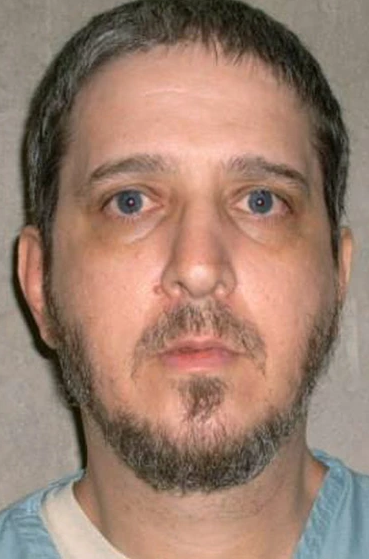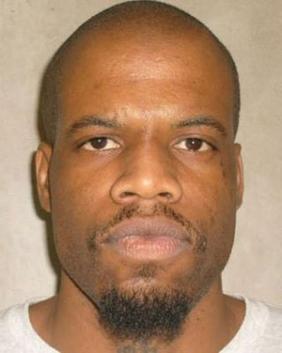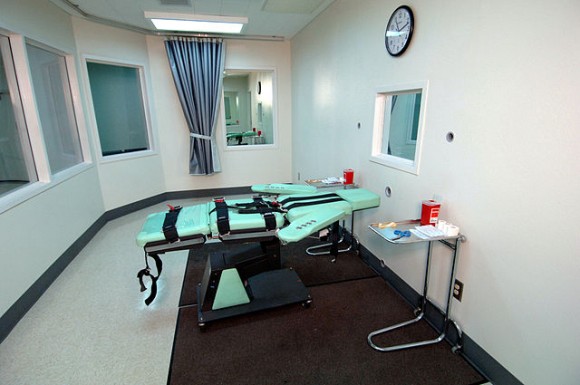aNewDomain — The State of Oklahoma has “administratively closed” the capital murder case against Richard Glossip, who was convicted for the 1997 death of Barry Van Treese in an Oklahoma City motel. The State effectively ended litigation on Friday, October 16 with an agreed dismissal, but it may resume as early as next year, subject to further review and multi-county grand jury investigation of the lethal injection process.
The Developing Case
Attorney General Scott Pruitt of the OAG announced on Friday:
As I have previously stated, my office is conducting a full and thorough investigation into all aspects of the Department of Corrections’ handling of executions. The Oklahoma Court of Criminal Appeals (OCCA) granted the state’s request for an indefinite stay of all scheduled executions.”
The agreement places a hold on all executions in the state for an indefinite period. During this time the state will resume its investigation of the consistently botched use of an unauthorized cocktail of execution drugs, including the improper use of potassium acetate instead of the mandated third-step drug potassium chloride, which stops the heart. Potassium acetate was improperly used in the execution of Charles Warner in January, as revealed in a recently disclosed autopsy report.
T he execution drug scandal intensified upon disclosure of Warner’s autopsy report because the improper drug cocktail was nearly used again to execute Glossip on September 30 — until prison officials discovered the mistake. This occurred just two hours before Glossip’s third appointment with death.
he execution drug scandal intensified upon disclosure of Warner’s autopsy report because the improper drug cocktail was nearly used again to execute Glossip on September 30 — until prison officials discovered the mistake. This occurred just two hours before Glossip’s third appointment with death.
In the interest of “judicial economy and comity,” according to the OAG’s legal documents filed in federal court in Glossip v. Gross, scheduled executions will be held in abeyance pending the outcome of the state’s investigation and implementing the necessary changes to the execution drug protocol. Pruitt also commented,
My office does not plan to ask the court to set an execution date until the conclusion of its investigation. This makes it unnecessary at this time to litigate the legal questions at issue in Glossip v. Gross.”
Dale Baich, Glossip’s attoney, said in response to the OAG’s decision,
We’ve always been concerned about transparency in the process of carrying out executions … Hopefully these investigations that Oklahoma intends to pursue will get to the bottom of what went wrong over the last year.”
Meanwhile, former Oklahoma Attorney General Drew Edmondson, who is representing the state Department of Corrections (DOC), requested on Thursday that the state attorney general’s multi-county grand jury quash subpoenas of prison records and depositions of his clients, including DOC director Robert Patton. Edmonson stated,
The most significant (reason) is there’s been no allegation of a crime, and it’s beyond the jurisdiction of the multi-county grand jury. In my opinion, and I think the law supports that, that they can’t just do a performance audit … There has to be an allegation of a crime. And I don’t see one there.”
The DOC hired Edmondson as an advisory attorney to provide legal counsel during the course of the investigation at the discounted rate of $300 per hour, pursuant to his attorney-client agreement. The next meeting of the grand jury will be convened on Tuesday, October 20.
Three appointments with death
During his 18 years on death row at the notorious “H” Block of McAlester’s maximum security state prison, Glossip has adamantly maintained his actual innocence in a killing carried out alone by the motel’s handyman, Justin Sneed, who testified against Glossip in exchange for a plea deal of life without parole to escape the death penalty. Glossip has been within hours of execution three times this year before finally winning a stay, due to the mixup of drugs in the lethal cocktail.
 This year’s bungled executions involving the wrong drug, potassium acetate, fall on the heels of the raging catastrophe following the torturous execution in April 2014 of Clayton Lockett. The execution was described as a “bloody mess” and like a “horror movie.” It resulted from an incorrect insertion of the IV needle — subcutaneously rather than intravenously — and without the properly-sized needle and ultra-sound tracking machine. This resulted in forty-three minutes of agonizing pain for Lockett — he finally died due to the potassium chloride and cardiac arrest.
This year’s bungled executions involving the wrong drug, potassium acetate, fall on the heels of the raging catastrophe following the torturous execution in April 2014 of Clayton Lockett. The execution was described as a “bloody mess” and like a “horror movie.” It resulted from an incorrect insertion of the IV needle — subcutaneously rather than intravenously — and without the properly-sized needle and ultra-sound tracking machine. This resulted in forty-three minutes of agonizing pain for Lockett — he finally died due to the potassium chloride and cardiac arrest.
This breakthrough in a tense legal battle of Glossip’s attorneys to save their client’s life, and those of three other inmates scheduled to die, marks a decisive victory for opponents of the death penalty who may have won the battle — but have not yet won the war. The agreement postpones executions until as early as Spring of 2016 and possibly a year from now because of the benchmarks that the State must meet before any executions may be rescheduled.
In any event, executions will not be rescheduled until at least 150 days following the announcement of the State’s conclusions in the extended investigation. Dale Baich, Glossip’s attorney and a challenger of the State’s protocol, said, “We agreed to stay the federal case until any investigations are completed and other benchmarks are met.”
The U.S. Supreme Court in the Fall 2015 session will again take up review of the constitutionality of capital punishment in America. Another decision will decide whether the ultimate sentence meets society’s standards of decency and whether there’s any penological purpose in carrying out public executions.
And there’s no more murder one cases, either …
Following aNewDomain’s careful review of criminal trial docket sheets in dozens of Oklahoma counties on the Oklahoma Supreme Court Network (OSCN), the court records show only two recently-filed murder one cases in recent months alleging a bill of particulars claiming aggravating circumstances to support imposition of the death penalty. These aggravators must be shown to be “death eligible.” This was alleged in Glossip’s case, and is labeled as such when the jury finds that the murder was especially heinous, atrocious, or cruel or that the defendant remains a continuing threat to society, among other factors.
 From dozens of death penalty cases making their way through the complex appellate process, the state has vastly curbed filing new capital cases. This is principally due to lack of funds and personnel.
From dozens of death penalty cases making their way through the complex appellate process, the state has vastly curbed filing new capital cases. This is principally due to lack of funds and personnel.
The reduction of death penalty cases indicates a form of self-correcting mechanism in the criminal justice system — not reported in the mainstream media — that prosecutor’s offices cannot afford to invest their limited human and economic resources to go the distance prosecuting death penalty cases in pursuit of executions against the “condemned and the damned,” as referred to by the legendary criminal trial attorney, Clarence Darrow.
Since prosecutors have developed such growing reluctance to file murder one cases as “death eligible,” given these practical considerations and the overall failure of the death penalty experiment, the conventional wisdom supports the conclusion that if the state “doesn’t use it, they should lose it.”
The “Joint Stipulation for Administrative Closing of Case Document” is linked here and Closing Order can be read here.
For aNewDomain, I’m Jim Kelly.
Images in order: Oklahoma State Courthouse via Wikimedia Commons; Richard Glossip via Public Domain; Clayton Lockett via Wikimedia Commons; Execution Room in San Quentin via Wikimedia Commons.













